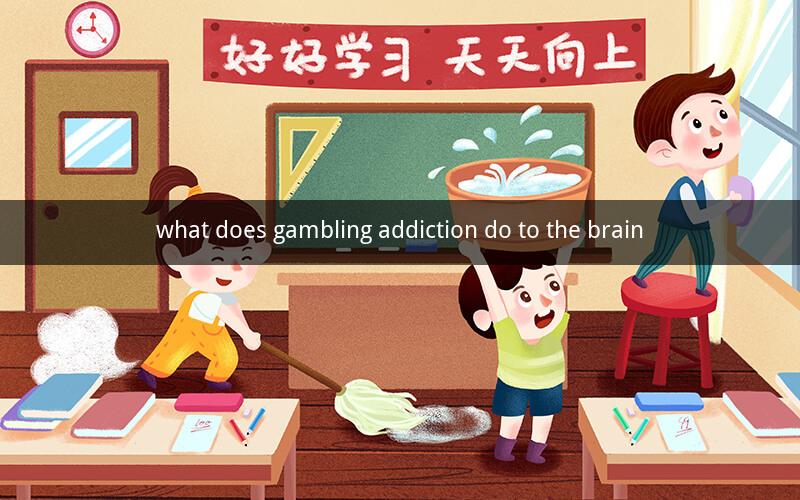
Understanding the Impact of Gambling Addiction on the Brain
Table of Contents
1. Introduction to Gambling Addiction
2. The Science Behind Gambling Addiction
3. Brain Changes Due to Gambling Addiction
3.1 Dopamine and Reward System
3.2 Prefrontal Cortex and Decision Making
3.3 Amygdala and Emotional Regulation
4. Cognitive Effects of Gambling Addiction
5. Psychological Effects of Gambling Addiction
6. Social and Economic Consequences
7. Treatment and Recovery
8. Conclusion
1. Introduction to Gambling Addiction
Gambling addiction, also known as problem gambling, is a behavioral disorder characterized by an inability to control or stop gambling despite negative consequences. It affects individuals from all walks of life and can lead to severe personal, social, and financial problems. This article explores the impact of gambling addiction on the brain, delving into the biological and psychological mechanisms at play.
2. The Science Behind Gambling Addiction
Gambling addiction is considered a form of addiction due to its similarity to substance dependence. Research has shown that the brain's reward system plays a crucial role in the development and maintenance of gambling addiction. When individuals engage in gambling activities, the brain releases dopamine, a neurotransmitter associated with pleasure and reward.
3. Brain Changes Due to Gambling Addiction
3.1 Dopamine and Reward System
The release of dopamine in the brain is a key factor in the development of gambling addiction. Dopamine levels increase during gambling activities, leading to a sense of euphoria and pleasure. Over time, the brain becomes accustomed to these high levels of dopamine, requiring more intense gambling experiences to achieve the same level of pleasure. This can lead to an increased risk of developing a gambling addiction.
3.2 Prefrontal Cortex and Decision Making
The prefrontal cortex, responsible for decision-making, planning, and impulse control, is also affected by gambling addiction. Research has shown that individuals with gambling addiction exhibit reduced activity in the prefrontal cortex, which can lead to impaired decision-making and increased impulsivity. This can result in poor financial choices and a higher likelihood of engaging in risky gambling behaviors.
3.3 Amygdala and Emotional Regulation
The amygdala, a brain region involved in processing emotions, is also impacted by gambling addiction. The amygdala plays a crucial role in emotional regulation, and changes in its function can lead to emotional dysregulation. Individuals with gambling addiction may experience heightened emotions, such as anxiety, stress, and depression, which can further exacerbate their gambling behavior.
4. Cognitive Effects of Gambling Addiction
Gambling addiction can lead to several cognitive effects, including:
- Impaired attention and concentration
- Memory problems
- Decision-making difficulties
- Reduced problem-solving skills
These cognitive effects can have a significant impact on an individual's daily life, affecting their ability to perform tasks, maintain relationships, and manage their finances.
5. Psychological Effects of Gambling Addiction
The psychological effects of gambling addiction can be profound, including:
- Depression and anxiety
- Low self-esteem
- Guilt and shame
- Relationship problems
These psychological effects can further contribute to the cycle of addiction, making it difficult for individuals to seek help and break free from their gambling habits.
6. Social and Economic Consequences
Gambling addiction can have severe social and economic consequences, including:
- Financial ruin
- Loss of employment
- Legal problems
- Family and relationship breakdown
The social and economic consequences of gambling addiction can be long-lasting and devastating, affecting not only the individual but also their loved ones.
7. Treatment and Recovery
Treatment for gambling addiction typically involves a combination of therapy, support groups, and self-help strategies. Cognitive-behavioral therapy (CBT) is often used to help individuals develop healthier coping mechanisms and address the underlying psychological issues contributing to their addiction. Support groups, such as Gamblers Anonymous, can provide individuals with a sense of community and encouragement.
8. Conclusion
Gambling addiction has a profound impact on the brain, affecting various aspects of an individual's life. Understanding the biological and psychological mechanisms behind gambling addiction is crucial for developing effective treatment and prevention strategies. By addressing the root causes of addiction, individuals can break free from the cycle of gambling and rebuild their lives.
Questions and Answers
1. What is the primary neurotransmitter involved in the development of gambling addiction?
- The primary neurotransmitter involved in the development of gambling addiction is dopamine.
2. How does the prefrontal cortex contribute to gambling addiction?
- The prefrontal cortex contributes to gambling addiction by impairing decision-making and impulse control.
3. What is the role of the amygdala in gambling addiction?
- The amygdala plays a role in emotional regulation and can become dysregulated in individuals with gambling addiction.
4. What cognitive effects can gambling addiction cause?
- Gambling addiction can cause impaired attention, concentration, memory, decision-making, and problem-solving skills.
5. What psychological effects are associated with gambling addiction?
- Psychological effects include depression, anxiety, low self-esteem, guilt, shame, and relationship problems.
6. What social and economic consequences can gambling addiction have?
- Social and economic consequences include financial ruin, loss of employment, legal problems, and family and relationship breakdown.
7. What types of therapy are effective in treating gambling addiction?
- Cognitive-behavioral therapy (CBT) and support groups, such as Gamblers Anonymous, are effective in treating gambling addiction.
8. How can individuals seek help for gambling addiction?
- Individuals can seek help through therapy, support groups, and self-help resources, such as websites and hotlines.
9. Can gambling addiction be prevented?
- Yes, gambling addiction can be prevented by promoting responsible gambling practices and educating individuals about the risks associated with gambling.
10. What is the importance of early intervention in gambling addiction?
- Early intervention is crucial in gambling addiction as it can help prevent the progression of the disorder and reduce the severity of its consequences.